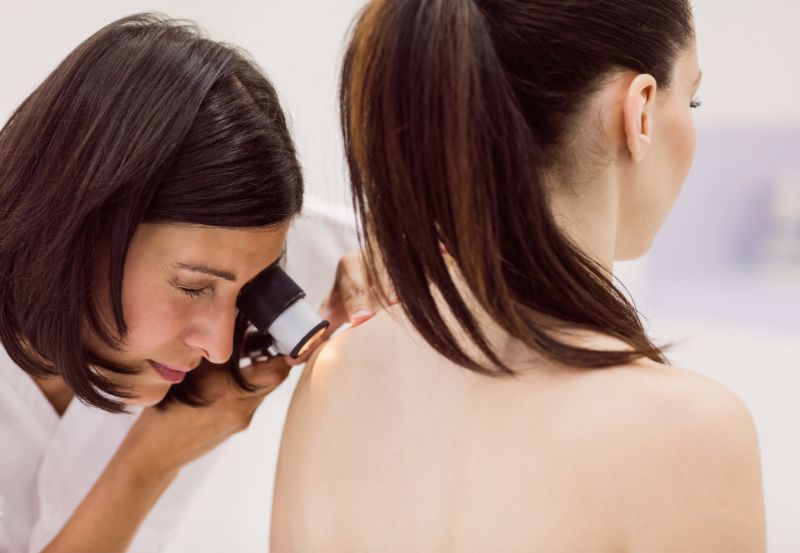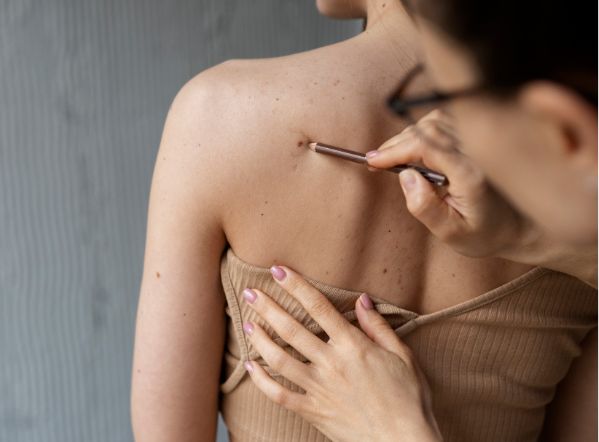
Why Is It Important To Have Your Skin Checked?
Queensland has one of the highest rates of skin cancer in the world
In Australia, most skin cancers are caused by too much exposure to UV radiation from the sun
Early detection significantly increases the chances of successful treatment and improves outcomes
The process is typically quick and painless, making it an easy but crucial part of your skin health regimen
“Queensland is known for having the highest rates of skin cancer globally. It is critical to have your skin checks done annually with a qualified skin cancer doctor.”
Queensland, known as the “Skin Cancer Capital of the World,” experiences the highest skin cancer rates globally. Each year, over 3,600 cases of melanoma and more than 350,000 non-melanoma skin cancers are addressed, exceeding road accident fatalities. This critical health issue underlines the necessity for enhanced sun protection awareness and the ambitious goal to reduce skin cancer incidents by 25% by 2050. Therefore, regular skin checks are indispensable in Queensland for the early detection and successful treatment of skin cancer.
Key Information
A skin check is a thorough examination of your skin by a healthcare professional, usually a dermatologist or skin cancer specialist, to look for signs of skin cancer or precancerous conditions.
Early detection of skin cancer can lead to a higher chance of successful treatment. Skin checks help identify suspicious moles or skin changes early on.
A skin check is a thorough examination of your skin by a healthcare professional, usually a dermatologist or skin cancer specialist, to look for signs of skin cancer or precancerous conditions.
Recommendations vary depending on your risk factors, but generally, an annual skin check is advised for adults. Those at higher risk may need more frequent checks.
Zinc oxide is a mineral compound that provides broad-spectrum protection against both UVA and UVB rays from the sun.
Zinc-based sunscreens work by forming a physical barrier on the skin that reflects and scatters the UV rays away, thus preventing them from penetrating the skin.
There are several advantages to using zinc-based sunscreens.
- Immediate protection upon application, as they do not need to be absorbed by the skin to start working.
- Non- irritating and anti-inflammatory, making it ideal for extremely sensitive skin or following clinical treatments.
- It is non-comedogenic and will not clog pores. Suitable for congested and acne-prone skin.
- Zinc-based sunscreens are generally more photostable, meaning they maintain their effectiveness for longer periods of time in the sun compared to some chemical sunscreens that may degrade over time.
While skin checks are very effective in detecting many skin cancers early, no screening method is 100% foolproof. It's important to continue self-examinations and report any changes to your doctor.
If something suspicious is found, the doctor may take a biopsy (a small sample of skin) to examine further. They will discuss the next steps, which could include monitoring, treatment, or referral to a specialist.
Be aware of new moles, changes in existing moles (size, shape, colour), sores that do not heal, or any new skin changes.
The ABCDE rule (Asymmetry, Border, Colour, Diameter, Evolving) can help you remember what to look for.
Come with clean skin free of makeup or nail polish. Have a list of any changes you've noticed in your skin, and be ready to discuss your own and your family's history of skin cancer.
Visiting a skin cancer clinic is a crucial step and proactive step towards looking after your skin health and overall well-being. Here are several reasons why seeking professional care at a skin cancer clinic is essential:
1. Early Detection Saves Lives
Skin cancer, when detected early, is highly treatable. Skin cancer clinics are equipped with experienced dermatologists who specialise in recognising the early signs of skin cancer, conducting thorough examinations to identify potential issues at the earliest stage possible.
2. Specialised Expertise
Dermatologists at skin cancer clinics possess specialised training in skin conditions, ensuring a higher level of expertise in diagnosing and treating various skin cancers. Their knowledge allows for accurate assessments and personalised treatment plans tailored to individual needs.
3. Advanced Technology and Equipment
Skin cancer clinics often have access to cutting-edge diagnostic tools and technologies, such as dermoscopy and mole mapping systems. These tools enhance the accuracy of skin cancer detection, enabling a comprehensive and detailed analysis of skin lesions.
4. Comprehensive Skin Examinations
Skin cancer clinics offer thorough skin examinations, including areas that may be difficult to self-monitor. Dermatologists are trained to identify suspicious moles or lesions that may go unnoticed by the untrained eye.
5. Education and Prevention
Beyond diagnosis and treatment, skin cancer clinics provide valuable education on sun safety, skin cancer prevention, and regular self-examinations. Understanding how to protect your skin and detect early warning signs empowers you to take an active role in your skin health.
6. Biopsy and Pathology Services
If a suspicious lesion is identified, skin cancer clinics can perform biopsies and send samples for pathology analysis. This ensures an accurate diagnosis and aids in developing an appropriate treatment plan.
7. Holistic Approach to Skin Health
Skin cancer clinics often adopt a holistic approach to skin health, addressing not only skin cancer concerns but also providing guidance on general skin care and overall well-being.
8. Peace of Mind
Regular visits to a skin cancer clinic offer peace of mind, knowing that your skin is regularly monitored by professionals who are dedicated to identifying and addressing any potential issues promptly.
As September 2021 update (subject to change) the Cancer Council Queensland recommends regular skin checks for early detection of skin cancer. The frequency of skin checks may vary based on individual risk factors and personal history. However, a general recommendation is to have a professional skin check every 12 months.
For individuals with a higher risk of skin cancer, such as those with fair skin, a history of sunburns, a family history of skin cancer, or a significant amount of sun exposure, more frequent checks may be advisable. It's essential to discuss your specific risk factors with a healthcare professional to determine the most appropriate schedule for skin checks.
Additionally, practicing regular self-examinations of the skin at home is encouraged. This involves monitoring moles and any changes in the skin's appearance and bringing any concerning changes to the attention of a healthcare professional promptly.
For the most accurate and up-to-date guidance tailored to your individual circumstances, it is recommended to consult with a local healthcare professional or dermatologist in Queensland

*‘If You Could See UV|Protect Your Skin.’ Youtube by cancerNSW.

Nadine's Skin Cancer Story

Corey's Skin Cancer Story

Ella's Skin Cancer Story
Videos by Cancer NSW
Aftercare Instructions for Cryotherapy
Lorem ipsum dolor
WHICH TREATMENTS ARE AVAILABLE?
Book in for a skin consultation with Dr Tina for an individualised treatment plan. Your best treatment will often depend on your age, gender, triggers and causes of your condition.
Dr Tina can advise on a combination including:
Where to find me
Locations
Australian Skin cancer clinic Annerley
Tuesday & Wednesday
11 Waterton St Annerley
QLD 4103 Australia
Tel: 07 3426 6800
SunDoctors Morningside
Friday & Saturday
Lifetime House, 6 Thynne Rd Morningside
QLD 4170 Australia
Tel: 07 3392 5700
RESTORE YOUTHFULNESS
Schedule a Consultation
Call us on 07 3852 4878 or simply book an appointment